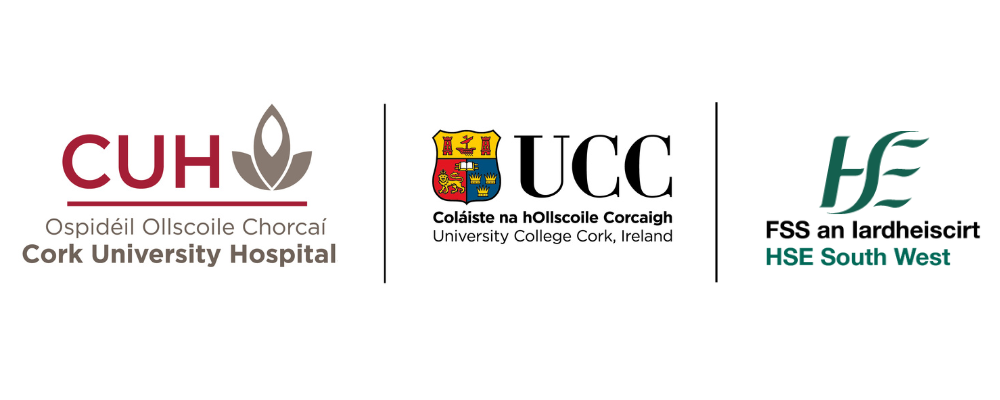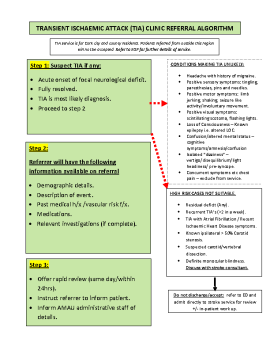Ambulatory TIA Clinic at CUH
Medical Professionals Information Guide for Transient Ischaemic Attack Referrals
Cork University Hospital - August 2025
Transient Ischaemic Attack (TIA) Service:
The current model for the CUH TIA service reflects newer evidence and consensus guidelines (European Stroke Organisation, 2021). The guidelines highlight limitations of the previous model and emphasise the importance of rapid review (within 24 hours) of suspected TIAs. Early review of suspected TIA has emphasised the need for same day review or admission.
TIA Service Referral Pathway:
The model for the TIA service is a Primary Care and Emergency Department (ED) referral pathway which is divided into low risk and high risk suspected TIAs.
Inclusion: (Please refer to service algorithm).
- Acute onset of focal neurological deficit.
- Fully resolved.
- TIA is most likely diagnosis.
- Exclusion: (Please refer to service algorithm).
A. High risk cases (not suitable for TIA clinic)
- Residual deficit (Any).
- Recurrent TIA’s (>2 in a week).
- Known ipsilateral >50% Carotid stenosis
- Suspected carotid/vertebral dissection.
- Definite monocular blindness (painless).
- TIA with Atrial Fibrillation / Recent Ischaemic Heart Disease symptoms.
- On anticoagulation
b. Features to suggest other conditions. These include
- Headache or previous migraine history
- Loss of consciousness
- Known epilepsy
- Confusion or altered mentation
- Concurrent symptoms such as chest pain etc
c. Resident outside Cork city or county.
Patients meeting above criteria:
If your patient meets the above criteria you can make a referral to the TIA service through its mobile phone number – 087 0904880.
This phone is carried by a member of the acute stroke team (Stroke Registrar or Advanced Nurse Practitioner) between the hours of 8.00am to 20.00pm Monday to Friday.
Referral to the service shall be triaged and accepted/declined during this call. Accepted referrals shall be seen within 24 hours of referral in a dedicated TIA service slot in the Acute Medical Assessment Unit. Patients will be contacted to attend the service at confirmation of referral being accepted. Patients unable/unwilling to attend will be referred back to their primary care physician for further action.
Patients who do not fit the above criteria for low risk TIA and deemed high risk must be advised to attend their nearest acute hospital. High risk cases attending CUH ED will be reviewed by the ED and referred to the acute stroke service after discussion.
Patients presenting to services on Friday evening/Saturday/Sunday will require admission and are deemed not appropriate for the service.
High risk patients seen between 20.00pm and 8.00am should be admitted for urgent review by the Stroke Medicine service on weekdays and the on-call Consultant Geriatrician at the weekend.
The TIA clinic will continue to be situated in the Acute Medical Assessment Unit. Accepted patients to the service will be advised to attend fasting at 8.00am and will be admitted to the TIA service at the administration desk in the department. Initial history and physical assessment will be carried out by a Stroke Advanced Nurse Practitioner or Stroke Registrar. Standardized investigations including laboratory work up including lipids, glucose and other appropriate tests, will be carried out. An ECG will be performed. Patients will then be referred for radiology tests including carotid artery and brain imaging if required. Following completion of these tests, a Stroke Medicine Consultant will review the patient and diagnosis/treatment or further investigation will be provided.

.png)
